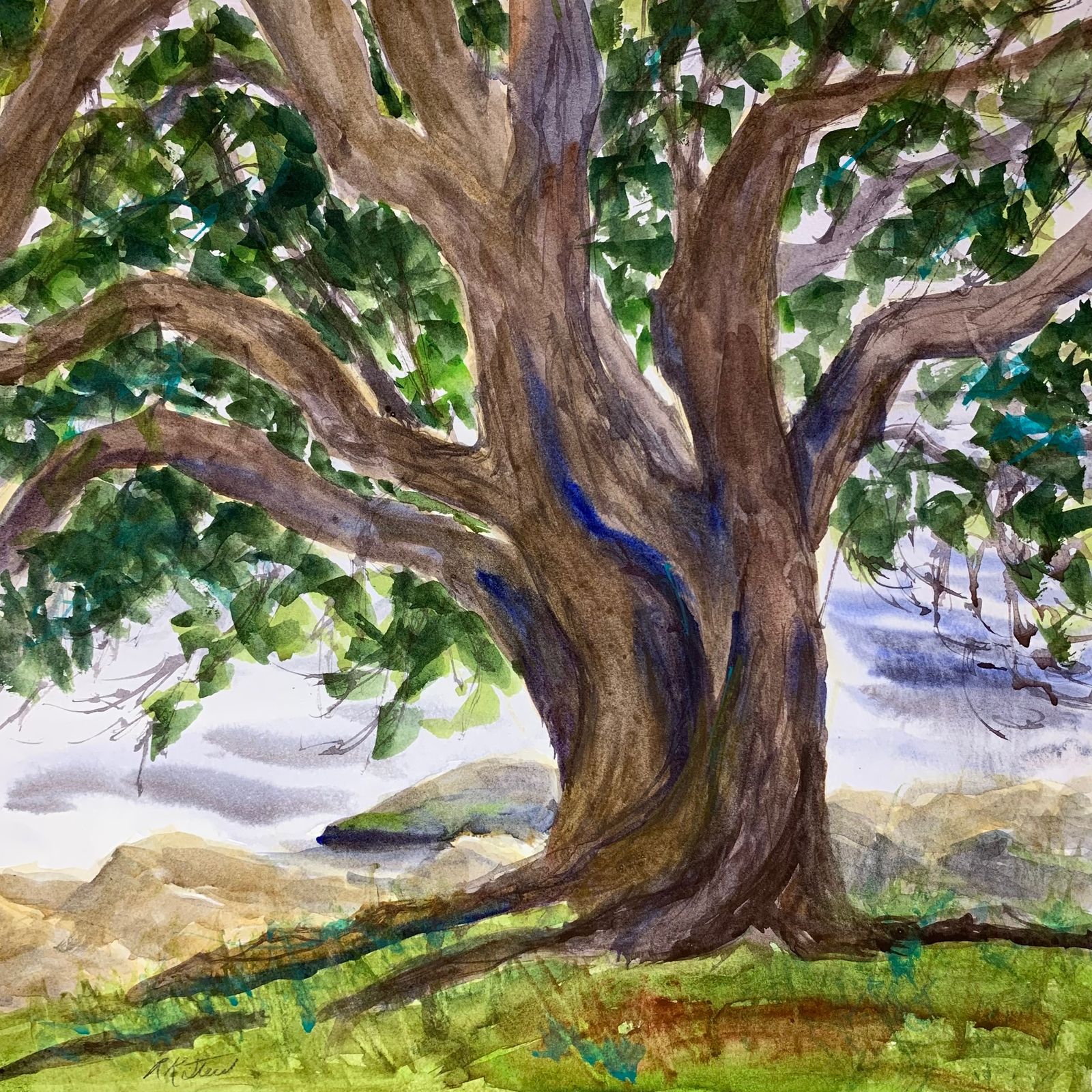twisty old apple
Published by Ronald Steed,
twisty old apple
keeps watch above the boulders
who stay the sea

This haiku moment at Harkness State Park in Waterford, CT, Saturday noon, August 14, 2021:
This thick, twisted, and ancient crabapple tree stands alone, close along the shore of Long Island Sound. She is large for an apple tree, and thriving, and wounded as old ones often are. The scars of smaller branches lost during life punctuate the thick beams, some sawed by human hands, others more naturally taken. There is, at her base, a place where two trunks appear to have fused over time, as if coming together was better than living apart. Its whole trunk seems to have been twisted counter-clockwise sometime in its life. Perhaps the storm-wind had a hand in this one's growth.
The moment calls to mind the community between this tree, the soil in which it flourishes, the rocks that lie on the downward slope just beyond it's trunk, the waters of the sound that wash the shore twenty feet below, and the winds that blow ashore here. The tree's branches reach out almost to the sound, shading the rocky breakwater (a welcome relief on hot summer days at low tide I would think!). I imagine at higher waters and during storms, the sea spray, and perhaps even the waters, reach for the tree above the buffeted slope. And yet the soil where her roots plunge deep, is steady, present, and un-eroded. The rocks live out their vocation-of-service in what strikes me as a relationship of mutual giving in spite of wind and water.
Some of the most threatening waves I have witnessed have been stirred up in the Sound. And yet, this tree seems to be high enough and just far enough from the sea, not merely to cling to life, but to thrive with it. An inch closer to the waters and the outcome might have been different. She has to be a stunning sight in spring (Roxanne affirms!). Here in August as I look into the branches, olive-sized crabapples ripen; all the tree's August energy going to seed.
This one is a high-watcher from her liminal boundary-place between sea and shore. Seaward, she scans the horizon from Groton to Fisher's Island to Long Island. She witnesses those who ebb and flow into New London, and them that pass between Race Rock and Cerberus Shoals. Under this day's summer sky there are sailboats and sport fishermen, ferry's and tug-bound barges. The view ashore is long and grassy up to the mansion above. A few visitors stroll along the shore and some farther up. There are no neighbor trees . . . this one has no companion or peer. She alone, among the trees of this place, listens most closely to nautical horns and whistles, wave-wash and bird-squawks . . . to child's play at the beach not far away.
And yet, I have a sense in the moment that she is not really alone, but has formed a lasting bond among those who live here year-round, and welcomes those who drop by. There are visitors to this sea-shore community. A bench in the shade draws in a toddler and her mom who come to take in the view and watch the painter. And down below, where the waters wash over the rocks, lies a string of tidal-pools whose rich aquatic life takes the measure of the moon twice each day. A couple sits on the shady rocks above the pools to share their way for a while. Black-flies are one of the village's more annoying visitors in August. And what shoreline community doesn't have challenging tourists? There is room for them too here, although I wish they wouldn't bite!
The couple moves from the rocks to set up chairs just beyond the bench under the shade . . . there is so much room under this tree that they don't seem close! As we pack up, they engage with us. "This is our favorite place", the man says. "We come here to sit, even in Winter", she adds. We compare notes about this tree in Winter, Spring, and Summer. I'm struck that they are drawn to this beautiful place the way we are drawn. Stone and soil, sea and storm, residents and visitors . . all of us gathered and kept together under the shade of this twisty old apple tree; as if coming together was better than living apart
Painting by Roxanne Steed
Haiku and meditation by Ronald Steed
Copyright 2021 ©